Related Research Articles

Sir Ian Holm Cuthbert was an English actor. After beginning his career on the British stage as a leading member of the Royal Shakespeare Company, he became a successful and prolific performer on television and in films. He received numerous accolades including two BAFTA Awards and a Tony Award, along with nominations for an Academy Award and two Emmy Awards. He was made a Commander of the Order of the British Empire (CBE) in 1989 by Queen Elizabeth II.

Sarah Kane was an English playwright, screenwriter and theatre director. She is known for her plays that deal with themes of redemptive love, sexual desire, pain, torture—both physical and psychological—and death. They are characterised by a poetic intensity, pared-down language, exploration of theatrical form and, in her earlier work, the use of extreme and violent stage action.
Franz Xaver Kroetz is a German author, playwright, actor and film director. He achieved great success beginning in the early 1970s. Persistent, Farmyard, and Request Concert, all written in 1971, are some of the works conventionally associated with Kroetz.

Edward Bond is an English playwright, theatre director, poet, theorist and screenwriter. He is the author of some fifty plays, among them Saved (1965), the production of which was instrumental in the abolition of theatre censorship in the UK. Other well-received works include Narrow Road to the Deep North (1968), Lear (1971), The Sea (1973), The Fool (1975), Restoration (1981), and the War trilogy (1985). Bond is broadly considered among the major living dramatists but he has always been and remains highly controversial because of the violence shown in his plays, the radicalism of his statements about modern theatre and society, and his theories on drama.

Lear is a 1971 three-act play by the British dramatist Edward Bond. It is a rewrite of William Shakespeare's King Lear. The play was first produced at the Royal Court Theatre in 1971, featuring Harry Andrews in the title role. It was revived by the Royal Shakespeare Company in 1982 with Bob Peck, and revived again at the Crucible Theatre, Sheffield, in 2005 with Ian McDiarmid.

The Sea is a 1973 play by Edward Bond. It is a comedy set in a small seaside village in rural East Anglia during the Edwardian period and draws from some of the themes of Shakespeare's The Tempest. It was well-received by critics.
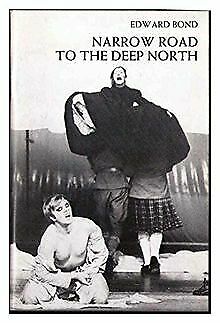
Narrow Road to the Deep North is a 1968 satirical play on the British Empire by the English playwright Edward Bond.
Zoe Ada Caldwell was an Australian actress. She was a four-time Tony Award winner, winning Best Featured Actress in a Play for Slapstick Tragedy (1966), and Best Actress in a Play for The Prime of Miss Jean Brodie (1968), Medea (1982), and Master Class (1996). Her film appearances include The Purple Rose of Cairo (1985), Birth (2004), and Extremely Loud & Incredibly Close (2011).

Raphael Sbarge is an American actor and filmmaker. He is perhaps best known for his roles as Jake Straka on The Guardian (2001–04), Jiminy Cricket / Dr. Archibald Hopper on Once Upon a Time (2011–18) and Inspector David Molk on the TNT series Murder in the First (2014–16). He is also known for voicing Carth Onasi in Star Wars: Knights of the Old Republic (2003), RC-1262 / "Scorch" in Star Wars: Republic Commando (2005) and Kaidan Alenko in the Mass Effect trilogy (2007–12).
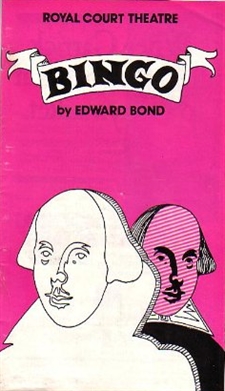
Bingo: Scenes of Money and Death is a 1973 play by English playwright Edward Bond. It depicts an ageing William Shakespeare at his Warwickshire home in 1615 and 1616, suffering pangs of conscience in part because he signed a contract which protected his landholdings, on the condition that he would not interfere with an enclosure of common lands that would hurt the local peasant farmers. Although the play is fictional, this contract has a factual basis. Bingo is a political drama heavily influenced by Bertolt Brecht and Epic theatre. Some have praised Bond's portrayal of Shakespeare while others have criticized it.

Ian McDiarmid is a Scottish actor and director of stage and screen. Making his stage debut in Hamlet in 1972, McDiarmid joined the Royal Shakespeare Company in 1974, and has since starred in a number of Shakespeare's plays. He has received an Olivier Award for Best Actor for Insignificance (1982) and a Tony Award for Best Featured Actor in a Play for Faith Healer (2006).

A Christmas Carol is a one-man stage performance by English actor Patrick Stewart of the Charles Dickens 1843 novella of the same title, which has been performed in the United Kingdom and the United States on occasion since 1988.

Bette Bourne is a British actor, drag queen, campaigner, and activist. His theatrical career has spanned six decades. He came to prominence in the mid-1970s onwards after joining the New York-based alternative gay cabaret troupe Hot Peaches. He then went on to form his own alternative gay theatrical company, Bloolips.

The Fool: Scenes of Bread and Love is a play by the English playwright Edward Bond. It traces the life of the poet John Clare against the backdrop of the Industrial Revolution, from his roots in rural East Anglia via literary success in London to his final years in a lunatic asylum. The play was first performed at the Royal Court Theatre in 1975, in a production directed by Peter Gill and featuring a cast including Tom Courtenay, David Troughton and Nigel Terry among others.
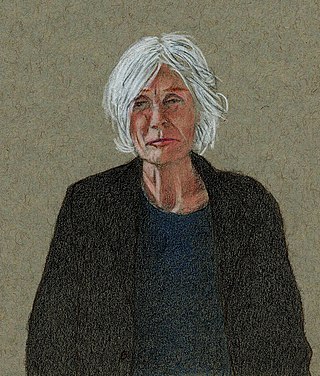
Caryl Lesley Churchill is a British playwright known for dramatising the abuses of power, for her use of non-naturalistic techniques, and for her exploration of sexual politics and feminist themes. Celebrated for works such as Cloud 9 (1979), Top Girls (1982), Serious Money (1987), Blue Heart (1997), Far Away (2000), and A Number (2002), she has been described as "one of Britain's greatest poets and innovators for the contemporary stage". In a 2011 dramatists' poll by The Village Voice, five out of the 20 polled writers listed Churchill as the greatest living playwright.
Light Shining in Buckinghamshire is a play by British playwright Caryl Churchill written in 1976.

Beatrice is a fictional character in William Shakespeare's play Much Ado About Nothing. In the play, she is the niece of Leonato and the cousin of Hero. Atypically for romantic heroines of the sixteenth century, she is feisty and sharp-witted; these characteristics have led some scholars to label Beatrice a protofeminist character. During the play, she is tricked into falling in love with Benedick, a soldier with whom she has a "merry war", after rumours are spread that they are in love with each other.
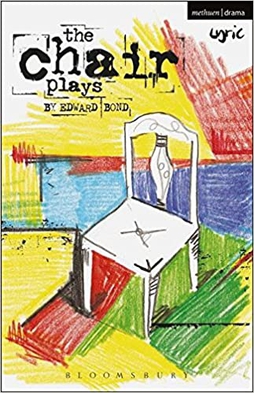
The Chair Plays are a trilogy of plays by English dramatist Edward Bond. The trilogy includes Have I None, The Under Room, and Chair. Have I None was premiered by Big Brum on 2 November 2000 at Birmingham's Castle Vale Artsite. The Under Room was also premiered by Big Brum at MAC in October 2005. Chair was written specially for radio, and while it was written in 2000, its first staged production was in Lisbon, at the Teatro da Cornucópia in June 2005. The London premiere of the entire trilogy was at Lyric Hammersmith, on 19 April 2012. Have I None and Chair received mostly positive reviews, but The Under Room polarized critics.
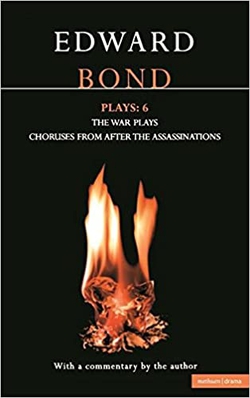
The War Plays is the name often given to a trilogy of plays by English dramatist Edward Bond: Red Black and Ignorant, The Tin Can People, and Great Peace.
References
- ↑ Arendt, Paul (1 August 2006). "Bond set to shock again with suicide bomber song". The Guardian. Retrieved 30 March 2021.
- ↑ "BBC Radio 4 FM - 22 July 1981 - BBC Genome". genome.ch.bbc.co.uk. Retrieved 30 March 2021.
- ↑ Stuart, Ian (1996). Politics in Performance: The Production Work of Edward Bond, 1978-1990. P. Lang. ISBN 978-0-8204-3014-0. "The play received a mixed reception from both critics and public. For many, the 1981 production was only redeemed by the acting of the main characters and the singing of Debbie Bishop as Rose."
- ↑ Gussow, Mel (2 August 1981). "STAGE VIEW; SHAKESPEARE'S COMMONERS GET THE ROYAL TREATMENT". The New York Times. ISSN 0362-4331 . Retrieved 30 March 2021.
- ↑ Gussow, Mel (2 February 1986). "Theater: 'Restoration,' Revised, at Arena Stage 12>". The New York Times. ISSN 0362-4331 . Retrieved 26 June 2020.
- ↑ Weeks, Stephen (1993). "Review of Restoration". Theatre Journal. 45 (2): 241–242. doi:10.2307/3208929. ISSN 0192-2882. JSTOR 3208929.
- ↑ Gardner, Lyn (15 September 2006). "Restoration, Old Vic, Bristol". The Guardian. ISSN 0261-3077 . Retrieved 7 July 2020.
- ↑ Cavendish, Dominic (2 October 2006). "On the road". The Telegraph. ISSN 0307-1235 . Retrieved 7 July 2020.
- ↑ Innes, Christopher (28 November 2002). Modern British Drama: The Twentieth Century. Cambridge University Press. p. 173. ISBN 978-0-521-01675-9.
- ↑ Ravenhill, Mark (8 September 2006). "Acid tongue". The Guardian. Retrieved 26 June 2020.
- ↑ Bond, Edward; Billingham, Peter (2007). "Drama and the Human: Reflections at the Start of a Millennium". PAJ: A Journal of Performance and Art. 29 (3): 1–14. doi:10.1162/pajj.2007.29.3.1. ISSN 1520-281X. JSTOR 30131055. S2CID 57568352.
- ↑ "Best of Bond". The Guardian. 21 January 2008. ISSN 0261-3077 . Retrieved 1 July 2020.
- ↑ Newmark, Judith (8 August 2011). "'Restoration' at St. Louis Shakespeare strangles old conventions". St. Louis Post-Dispatch. Retrieved 13 July 2020.
- ↑ Womersley, David. "The Social Affairs Unit - Web Review: Edward Bond attempts - and fails - to use drama as a medium to promote "advanced" opinion: Restoration - Edward Bond". Social Affairs Unit. Retrieved 22 June 2020.
- ↑ Amory, Mark. "Theatre » 1 Aug 1981 » The Spectator Archive". The Spectator Archive. Retrieved 30 March 2021.
- ↑ "Fools enslaved to hierarchy". Evening Standard. 26 September 2006. Retrieved 30 March 2021.